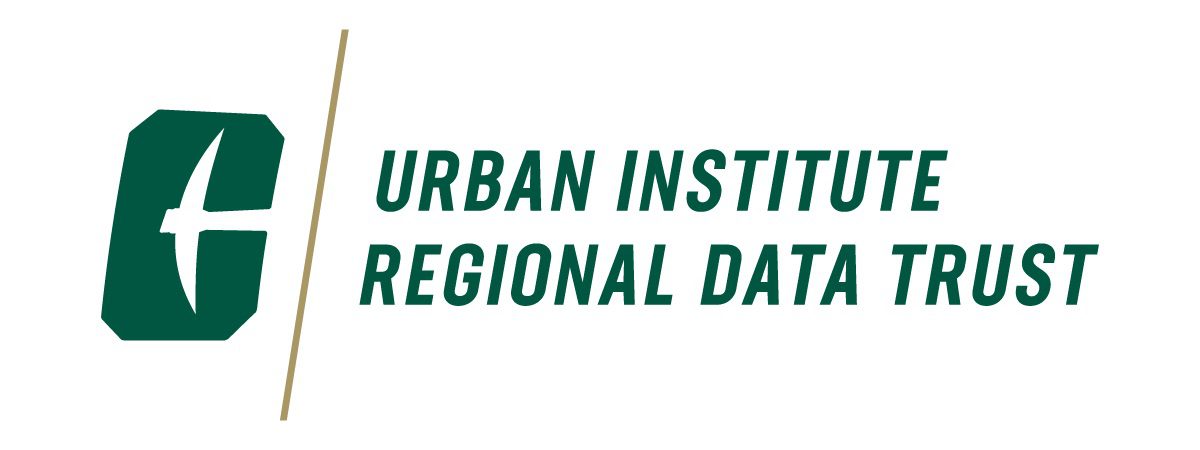What We Do

The UNC Charlotte Urban Institute is our region’s applied research and community outreach center. We seek solutions to the complex social, economic and environmental challenges facing our communities. We engage expertise across a diverse set of disciplines and life experiences to curate data, conducting actionable research and policy analysis that helps us make better decisions that benefit all of us.
The Charlotte Regional Data Trust is a community-university partnership that links administrative data across service and organizational silos in order to provide information our community can act on. The Data Trust is a 501(c)(3) governed by a board of community stakeholders and staffed by the Institute. The Charlotte Regional Data Trust Board of Directors guides the strategic research priorities of the Institute.
Our Services
We build transparent partnerships to provide a range of effective services:
- Community Research Services include process and outcomes evaluations, asset & needs assessments, ecosystems analysis, and survey research.
- Data Services include the integrated data system of the Charlotte Regional Data Trust as well as other data visualization, mapping, and analytic services.
- Regional Policy Analysis includes gathering existing evidence, developing new knowledge, and creating tools and resources on key issues that impact the Charlotte region.
- Research Translation and Engagement Services focus on ensuring that leaders and the public have access to rigorous yet accessible information to guide decision-making on key issues.
What to expect when you work with us
We work with a variety of partners, from public agencies to nonprofits to academic organizations. Here’s a general overview of our process
- Initial discovery meeting. We start every engagement with a meeting to explore a clients’ goals, needs, resources and ideas.
- Scope of work. From there, we develop an initial scope of work and a proposal for the project. This guides both our work and the contract process.
- Contract. After agreeing on a scope of work, we agree on a contract and work with the University’s Division of Research to usher it through to signing. This typically takes at least several weeks.
- Project execution. Then, we develop a detailed research and analysis plan, review and revise it with the client, and then implement the project. We work with partners closely to inform the research throughout planning and implementation.
- Completion. Once we have findings, we complete a report and the agreed-upon deliverables. We go through a comprehensive review process to ensure accuracy, reliability and the highest standards for our work.
- Contingency planning. While we work to complete all projects on time, research can sometimes take longer than expected, particularly when data collection involves interviews or establishing new data agreements. We anticipate this as much as possible in our initial timeline and will work proactively with partners if any schedule changes are needed.
Public benefit
We’re committed to helping Charlotte and its surrounding communities navigate the social, environmental and economic challenges faced by this growing region. That’s at the core of our mission, whether we’re researching tree canopy loss, studying how to create more affordable housing, building a better transit network or helping nonprofits figure out if their programs are working. To meet these goals, we involve the community, work with UNC Charlotte students and faculty, and employ a diverse staff that reflects our dynamic community. We also endeavor, to the greatest extent practicable, to share our findings with policymakers and the public so that our community can benefit.
University constraints
As a part of the UNC System, we are a nonpartisan institute. We don’t take stands on political issues or in elections. Some additional constraints you should be aware of include: Public records. UNC Charlotte is a public entity and an agency of the State of North Carolina. Generally speaking, records and information compiled by UNC Charlotte are property of the people. With few exceptions, in order to promote governmental transparency and accountability, North Carolina’s Public Records Act permits the public to access those records and information upon request.
Publication restrictions
Section 500.1 of the UNC Policy Manual affirms our institutional commitment to the integrity of our research and to the dissemination of our research findings. Consistent with that commitment, the policy sets an expectation that institutions only agree to restrictions on the right to publish research findings in extraordinary circumstances. The policy also requires that constituent institutions avoid publication restrictions that interfere with the publication or oral defense of student theses or dissertations.